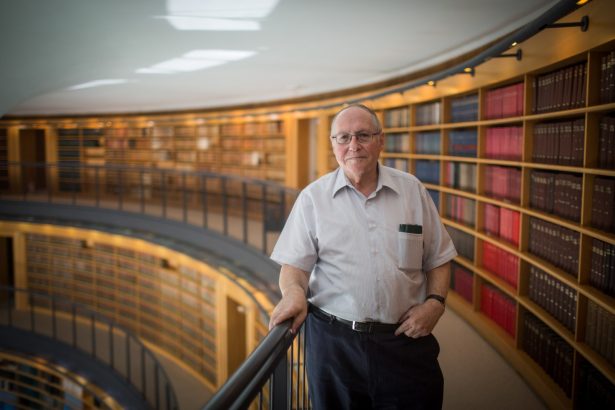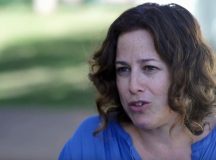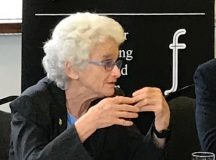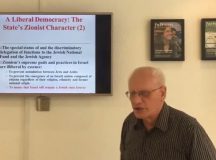Elyakim Rubinstein is the former Attorney General of Israel and served as the Vice President of Israel’s Supreme Court. In this Fathom interview with Fathom Deputy Editor Samuel Nurding, he discusses the state of the peace treaties that he helped negotiate with Egypt and Jordan, assesses claims that the Supreme Court is overly activist, calls for the Nation-State Law to be amended, and recounts his own considerations as attorney general when examining corruption cases involving former prime ministers.
Samuel Nurding: Can you talk a little about your family’s history?
Elyakim Rubinstein: My mother came to Israel at the age of eight in 1922 with her parents, later becoming a graduate of the American University of Beirut. After the White Paper of 1939, Jews from Eastern and Central Europe wishing to enter Palestine were not permitted to do so, and the British sent many of them to Mauritius. My mother was a member of the medical delegation that was sent by the British to Mauritius in 1945 to bring those Jews to our country. In 1948, when I was 11 months old, she volunteered during the War of Independence to be the first head matron of the military hospital. My father was a soldier. I was left with an aunt and uncle. Both my parents were serial volunteers and very active in local and public affairs.
‘It was like the wings of history were present’: Israel’s peace treaties
SN: You were part of the Israeli delegation at Camp David and subsequent delegations in Madrid and Jordan. As we mark forty years of peace between Israel and Egypt, what are your most significant memories of those negotiations? And how do the hopes of peace you had then match up to the reality today?
ER: I was at the airport welcoming President Anwar Sadat in November 1977. The visit had not been on the cards ten days earlier. Our Prime Minister at the time, Menachem Begin, had a sense of drama – the same way Sadat did. Sadat said in a speech that he would come to Jerusalem for peace. Begin saw the opportunity and invited him, and Sadat accepted the invitation. I was not supposed to be at the airport but I was Chef de Cabinet, i.e. the assistant to Moshe Dayan, who was then Foreign Minister, and when he asked me whether I’d like to join him and go to the airport, I said yes. It was like the wings of history were present at the airport. And look, strategically and fundamentally, peace has been a success. Previously, we experienced five wars between Israel and Egypt in 30 years but since then, we have enjoyed 40 years without any. From this point of view, the declaration by Begin and Sadat of ‘no more war’ has been fulfilled.
But yes, we were indeed hoping that the quality of peace, and the relationship between our peoples – rather than just governments – would be better, in terms of trade, culture, business and tourism. We brokered several agreements at the time to ensure that was so but I think that education for peace is lacking in Egypt and in other Arab countries.
SN: You were also central to the peace deal with Jordan. Were there any noticeable differences or similarities in the way Jordan made peace with Israel, compared to Egypt?
ER: As I suggested in a recent article in the Cairo Review of Global Affairs, the main objective for Sadat at Camp David was regaining the Sinai. The Palestinian issue was important but secondary. The Americans epitomised the inverse. President Carter came with the mission to do something for the Palestinians, though he understood that this was implausible without a peace agreement with Egypt, whilst the Israeli priority remained reaching a peace with Egypt.
With Jordan, Israel had been trying to facilitate a Jordanian-Palestinian joint delegation at Madrid and then in Washington, the idea being that the permanent solution will involve both of them together. Neither were particularly enthusiastic about the arrangement but it somehow worked until Oslo. Jordan has a large number of Palestinians, so they did want a solution for them, but a priority for them was also creating a relationship with Israel which would ensure that there was a recognised boundary between Jordan and Israel.
I am disappointed that the Jordanians have now announced they want to bring to an end to the two special regimes which we created [where Israel had been given rights to use land from Jordan for 25 years with an option to extend]. I still hold out hope that planned consultations between the two countries will be conducted and they will find a proper solution, because this was the wish of the two leaders that reached the peace treaty, King Hussein and Prime Minister Rabin, and because the strategic relationship between Israel and Jordan holds benefits for both sides, despite the challenges.
Judicial activism in Israel: Has the Supreme Court overreached?
SN: There have been many critics, mostly from the Right, of the constitutional revolution advanced in the 1990s which saw increased judicial activism of the court in Israel today. Do you think the Right have a case that the judiciary is now overbearing in politics? And what do you think should be the correct balance between the Knesset and the Supreme Court?
ER: I believe that whilst the court may make errors like any human institution, it has been the defender of human and civil rights and a strategic asset for the State of Israel. It has been respected everywhere and has, for example, good relations with the British Supreme Court, as with the leading court of several other countries, which shows how well esteemed the Israeli Supreme court is. I don’t think any initiative to curb its powers is appropriate; this would constitute a serious setback.
The so-called ‘constitutional revolution’ was recognised and described by Meir Shamgar (President of Supreme Court 1983-95) and Aharon Barak (1995-2006). But the real constitutional revolution is in the basic laws [passed by the Knesset], the most relevant of which is the Basic Law: Human Dignity and Freedom passed in 1992. If you read that, you will find – and you don’t have to be a lawyer or even a law student to find it – that the constitutional revolution is happening right there, as early as that.
Personally, I am not enthusiastic about the terms ‘activist’ and ‘non-activist’. I’d prefer people to actually read individual court decisions. The court’s reasoning behind all its decisions on constitutional issues and important government issues are set out in great detail and the public can see clearly why the court chose this or that path.
I do not think that the court is overreaching. There can be legitimate criticism of particular decisions of course, and sometimes the court itself will have a minority that disagrees with a decision. One can disagree in a well-mannered way, after actually reading the decisions. But too many base their objections on newspaper headlines. There is a perception in certain circles, mainly conservative ones, that the court is ‘too left wing, too secular, too liberal’ and so on. I think that’s a great exaggeration. In fact, there are many times that the court doesn’t want to decide and pleads with the government to correct, clarify or formally adopt a decision, as with issues of conversion and in other cases. When the government does not do this because of political reasons – sometimes they do not want to and sometimes they cannot – the court has to decide and people then react in negative ways.
Israel as a Jewish and democratic state and the Nation-State Law
SN: The Nation-State Law last year caused controversy in Israel. I spoke to Ruth Gavison last year about the law and she said that it should have included not just a commitment to the Jewish self-determination, but also a commitment to human rights and democracy. What are your views about the law and about the balance between the Jewish and democratic components of Israel?
ER: Israel is the only Jewish state on earth, which we deserve after the years of exile and persecution which culminated with the Holocaust. The Jewish state is a must but democracy is also a must. I think that democracy is embedded in Jewish values and represents the right of all, including Israel’s minority. In my experience as a civil servant, attorney general, cabinet secretary and as a justice on the Supreme Court, there is no contradiction between ‘Jewish’ as the identity of the nation-state and ‘democratic’ as the mode of governance, and the concept ‘Jewish and democratic’ should be maintained.
I am not against the Nation-State Law, which may serve as a chapter in a future codified constitution, but I do support amending it. First, there are petitions against the law in the Supreme Court and they are still pending. Though, regardless of the ‘legal’ side of the situation, the state needs to give minorities in Israel the confidence that they are equal, which is already enshrined in the Declaration of Independence (as it should be).
I am not usually one for amending the basic laws too frequently. There is a need, though, to add equality to the Nation-State Law and I recently wrote a letter to Prime Minister Netanyahu suggesting this. There also needs to be an amendment to the Arab language article, but primarily the concern should be adding a notion of equality. It will not in any way derogate from the character of Israel as a Jewish and democratic state. It will only add respect for the country’s minorities.
SN: During the 2019 elections in Israel, the Central Elections Committee had to decide on whether Jewish Power and the National Union could participate. In 2015, on the Court, you supported preventing Hanin Zoabi from Balad, from running. From your experience, what should be the principles that determine who should and should not stand in the Knesset?
ER: I based my judgement then on an explicit reading of the Basic Law of the Knesset which bans people who are either against Israel as a Jewish and democratic state or are racists, from participation in elections. Before that in 1999 I expressed my view as Attorney general that Azmi Bishara of Balad should be disqualified. The majority of the Court did not accept my view but a few years later Bishara was suspected of security offenses and subsequently fled from the country never to return. So, you can make your own judgment. The court supports the freedom of expression and the freedom of elections; it is very unusual to disqualify candidates. I believe that the line can be found at the refusal to accept Israel as a Jewish and democratic state and being racist, as stipulated by the Basic Law.
The Rule of Law
SN: Given your experience as the Attorney General who investigated Ariel Sharon, can you explain the considerations that this attorney general would have gone through over the last few months in deciding whether or not to indict a sitting Prime Minister.
ER: Netanyahu still has a hearing and is entitled to enjoy the presumption of innocence. We do not want to convict the prime minister in the media before there is an indictment and a trial. The basic consideration here is evidence. Like everybody else, I am not privy to the evidence of state witnesses and what they have said, beyond what has leaked in newspapers. I think that Mandelblit was agonising over the evidence, and as you can see from the decision, there were different points of view within his own team for him to consider before he made his decision. What Netanyahu and his lawyers will do, once they receive the materials, is to attempt to show their point of view. While the whole affair is sad, it does show that the rule of law is working. We have the police, the district attorney, the state attorney and the attorney general all working together under the rule of law. So, if you have free elections, freedom of expression, freedom of the press and the rule of law, then that’s democracy. I think that people should remember this side too, without prejudice and without expressing specific opinions on the pending cases. I should add that using parliamentary immunity if there is a decision on an indictment is inappropriate.
[In a discussion on Israeli radio – which took place after this Fathom interview – Rubinstein was highly critical of discussions regarding the changing of the immunity law. “If we reach a situation in which an individual whom the attorney general thinks needs to be indicted after a hearing…and immunity will be a refuge that will turn us into a Third World country. That is something that truly is a foolish idea, in my opinion, and I’m speaking not as someone who hates Netanyahu and I also admire things that he’s done. That isn’t something that we can withstand from an ethical perspective as a properly-run country. That isn’t what immunity was designed for. The law needs to be equal for all of us.”]
SN: In the 1990s, when you were attorney general, there were two or three cases that came across your desk about Netanyahu, which were all ultimately dropped due to a lack of sufficient evidence. What did you tell Netanyahu then?
ER: I do not have all of the material in front of me now and it has been 20 years but I believe I introduced the idea that in a public investigation when an attorney general closes or partially closes a case, it is important to publish a detailed decision to the public. Why? Because after the investigations, if you publish only a short conclusion, people will be puzzled and may petition the Supreme Court. They are entitled to an explanation, and in any case, if there is a petition, one will have to explain to the Court, so why not precede that with a detailed decision. I also believed that to do this was of great educational value to the public. In those cases, which involved gifts, I believe I said that it was ‘ugly,’ even though it did not reach the level of criminal evidence. Again, without expressing a view on current cases, Netanyahu has a presumption of innocence and will have a hearing at the end. I would not go beyond that.




































